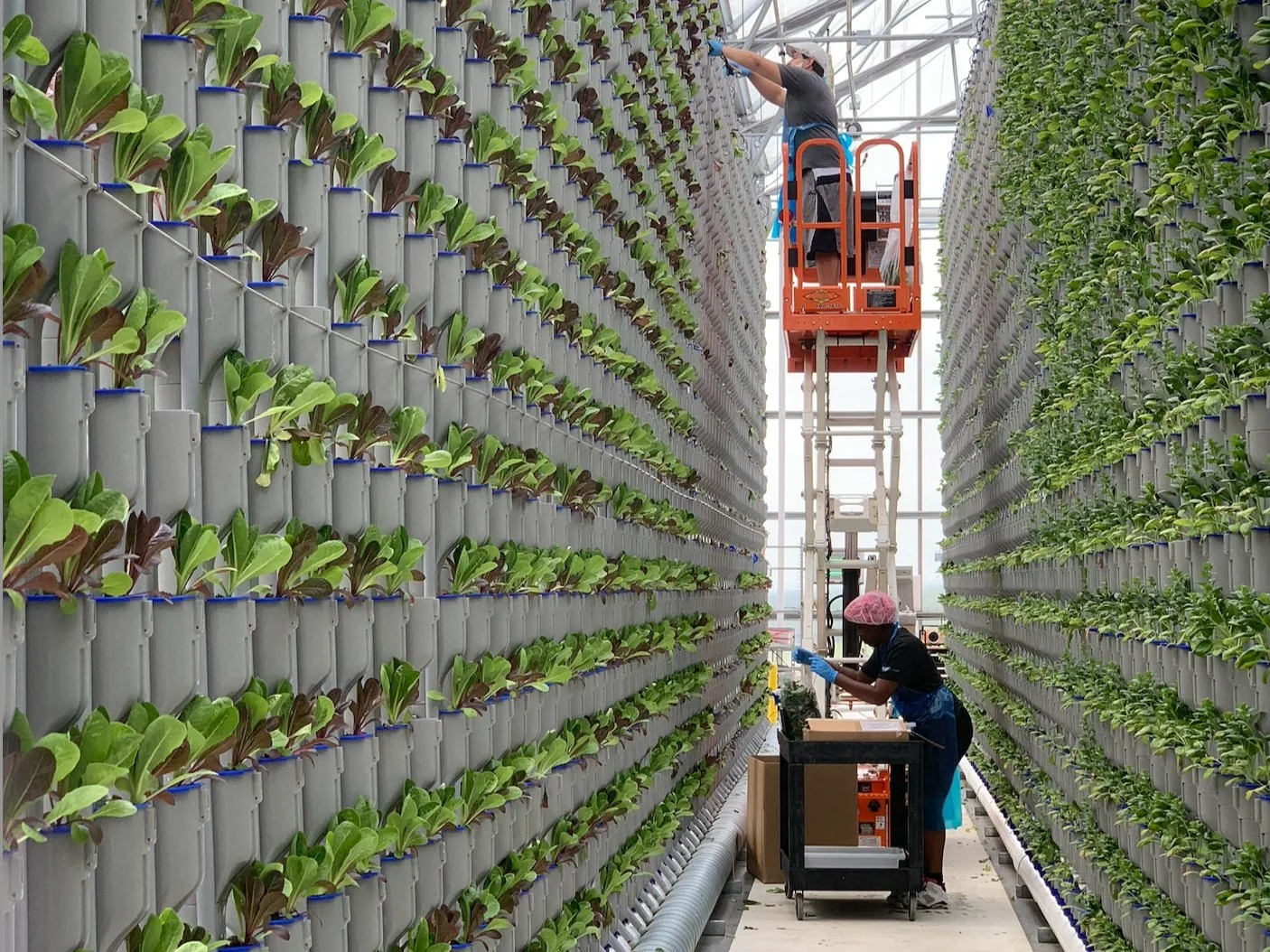What Is an Agricultural Engineer?
Agricultural engineering is an advanced STEM field. Through technology, agricultural engineers improve and optimize farming. They design tools and systems that help farmers grow more food using less water and energy. They also work to make farming safer for the environment.
If you like technology and nature, consider a career in agricultural engineering. Eden Green Technology uses commercial hydroponic systems to grow fresh food sustainably. Agricultural engineers are vital in these efforts. This article will examine this fascinating field. We'll explain what agricultural engineers do and how they are working for the better.
What Is Agricultural Engineering?
Agricultural engineering combines biology, technology, and environmental science to improve farming. These engineers work on making farming tools and systems more efficient and sustainable. They design equipment to grow more crops with fewer resources, like water and energy. They also develop methods to protect the environment while boosting food production.
What Does an Agricultural Engineer Do?
Agricultural engineers have many important roles. They design and improve tools and systems to make farming easier and more efficient. Their work helps farmers grow more food, save water, and protect the environment. The sections below will explore some of the key responsibilities of agricultural engineers and discuss some of their different areas of specialty.
Key Responsibilities of Agricultural Engineers
Agricultural engineers have several important jobs that help improve farming methods. They create and enhance tools and systems that farmers use every day. They also work on ways to save water and energy on farms. Below, we'll look at some of these key tasks in more detail.
Design and Development
Agricultural engineers design and develop tools to help farms work more efficiently. They might create machines that plant seeds, harvest crops, or manage farm water use. Their designs make farming easier and help produce more food with less effort.
Process Optimization
Process optimization is about finding ways to make processes faster and more efficient. Agricultural engineers look for ways to improve farming operations. They might make a machine work better, reduce the time it takes to plant or harvest, or find a way to use less energy and water.
Environmental Sustainability
Environmental sustainability is a key focus for agricultural engineers. They work on projects that help farms use resources like water and energy more wisely. An example includes designing systems that reduce waste and pollution. Their work helps protect the environment while supporting food production.
Research and Analysis
Research and analysis are important parts of agricultural engineering. Engineers in this field study data and conduct experiments to find better farming strategies. They might research new methods for growing crops, study how to improve soil health, or analyze how different farming techniques impact the environment. Their findings help shape the future of farming.
Technical Support
Agricultural engineers provide technical support to farmers and agricultural businesses. They help solve problems with farming equipment and systems, ensuring everything runs smoothly. This support is crucial for keeping farms productive and efficient.
Resource Management
Resource management involves wisely using resources like water, energy, and soil. Agricultural engineers design systems that help farmers better use resources while minimizing waste. This ensures farms operate sustainably and produce food for future generations.
Food Processing and Safety
Agricultural engineers also play a role in food processing and safety. They develop methods for processing food to ensure it is safe to eat. Strategies include designing ways to preserve food quality during processing and storage. It can help reduce waste and protect public health.
Specializations
Agricultural engineering is a broad field with many different areas of focus. Engineers take on various specialties, each dealing with a specific farming area. These specializations allow engineers to become experts in certain areas. They may focus on designing machines, managing water resources, or improving food safety. Taking on a particular specialization allows agricultural engineers to develop advanced skills and better contribute to solving specific challenges in farming. Below, we’ll explore some of the key specializations within this field.
Farm Machinery
Farm machinery is a key area in which agricultural engineers specialize. They design and improve machines like tractors, harvesters, and planters. Engineers work to make these machines more efficient, reliable, and easy to use. They may also design advanced farm machinery, like robotics or AI-powered sensor systems. Improving machinery for farms helps farmers save time and increase productivity.
Power Systems
Power systems are another important specialization in agricultural engineering. Engineers in this field develop and improve power sources to run farm equipment. One example is designing systems that use energy more efficiently. Another is using renewable energy sources rather than fossil fuels with electric or hybrid engines.
Irrigation
Irrigation is all about managing water use on farms. Agricultural engineers design systems to deliver water to crops more efficiently. These systems ensure crops get enough water without wasting this precious resource. Efficient irrigation systems are crucial, especially in areas where water is scarce.
Drainage
Drainage removes excess water from fields to prevent flooding and soil erosion. Engineers design systems that help control water levels in farm fields. Proper drainage is needed as too much water can damage crops and reduce soil quality. By managing water effectively, these engineers help maintain healthy farmland.
Bioprocess Engineering
Bioprocess engineering uses biological processes to develop new ways of processing agricultural products. Engineers turn raw materials, like crops, into other useful products. These may include biofuels, food ingredients, and biodegradable materials. They use biology and technology to make these processes more efficient and sustainable.
Environmental Engineering
Environmental engineering in agriculture is about protecting the environment while supporting farming activities. These engineers develop systems that reduce pollution and manage waste. They also work to conserve natural resources like water and soil. They help farms operate more sustainably and reduce their environmental impact.
Structural Engineering
Structural engineering in agriculture involves designing and constructing structures used on farms. Examples include barns, silos, greenhouses, and storage facilities. It can also include structures within buildings, such as the towers in our hydroponic greenhouses. These engineers ensure structures are safe, durable, and well-suited to their purpose. They also help refurbish existing structures to be more effective and efficient.
Food Process Engineering
Food process engineering focuses on how food is processed after it is harvested. Engineers develop systems that ensure food is safe, nutritious, and high-quality. They also work on preserving food during storage and designing packaging that keeps food fresh longer. This specialization is key to reducing food waste and improving food safety.
Educational Background of Agricultural Engineers
Agricultural engineers need to study science and math.. Most start with a bachelor’s degree in some type of engineering. They also study topics like biology, chemistry, physics, and math. These fields are essential for understanding how to apply engineering principles to agriculture.
Beyond these core subjects, many students focus on their future specializations. Areas like irrigation, farm machinery, and environmental sustainability are common. Many programs also include hands-on experience through internships or lab work. These options allow students to apply what they’ve learned in real-world settings.
Some agricultural engineers go on to earn a master’s degree or PhD. Higher education can lead to specialized roles or positions in academia or research.
Overall, this educational path prepares engineers to tackle complex challenges in modern farming. They must use both traditional knowledge and cutting-edge technology.
What Skills are Essential for an Agricultural Engineer?
Agricultural engineers need a mix of technical and practical skills to be successful. Here are some of the most important skills:
Problem-Solving Skills: Agricultural engineers often face complex challenges that need creative solutions. Critical thinking and problem-solving are key for almost all specialties within the field.
Technical Knowledge: They need a strong understanding of engineering principles. Knowledge in areas like biology and environmental science is also essential. A solid technical background helps engineers design effective tools and systems for farming.
Communication Skills: Agricultural engineers need to work with a variety of people. They must communicate with farmers, other engineers, and government officials. They need to explain their ideas clearly and collaborate effectively.
Attention to Detail: Precision is important in agricultural engineering. Paying attention to details helps prevent mistakes and ensures systems work as intended.
Project Management: Many agricultural engineers manage projects from start to finish. Skills include planning, organization, and the ability to oversee different aspects of a project. They must handle budgeting, scheduling, and coordinating with team members.
How Does an Agricultural Engineer Contribute to Sustainable Farming?
Agricultural engineers play a crucial role in sustainable farming. They develop technologies and systems that reduce the environmental impact of agriculture. They design equipment and processes that conserve resources while still producing high yields.
Also, agricultural engineers work on projects that reduce pollution and waste. They design ways to manage farm waste so harmful materials don’t impact the environment.
Companies like Eden Green Technology operate on innovations created by agricultural engineers. They use this tech to grow food in a way that’s better for the environment. Engineers in our sustainable agriculture careers help create productive, eco-friendly farming systems. These specialists are vital in shaping farming to be more environmentally responsible.
What Is the Difference between an Agronomist and an Agricultural Engineer?
Agronomists and agricultural engineers both work to improve farming. Yet, they focus on different aspects of agriculture. Agronomists concentrate on the science of growing crops. They study plants, soil, and climate to help farms produce healthy crops. Agricultural engineers focus on the technology used in farming. They design and develop tools, machines, and systems to improve efficiency and sustainability.
Let's look at what these professionals do and how their roles contribute to farming.
Agronomists:
Agronomists specialize in understanding how to grow crops in the best possible way. They study the soil, plants, and weather to determine what crops need to thrive. Agronomists help farmers choose the right seeds and fertilizers for their operations. They help them pick the right methods for growing healthy plants. They also work to protect crops from pests, diseases, and changing weather conditions. Their main goal is to improve crop production and keep soil healthy for future farming.
Agricultural Engineers:
Agricultural engineers focus on the technology and tools that make farming more efficient. They design machines that help with planting, harvesting, and processing crops. They also create systems to manage water and energy use on farms. While agronomists are experts in biology, agricultural engineers are tech experts. They specialize in equipment and systems that make farming easier and more productive.
Working at Eden Green Technology
At Eden Green Technology, we proudly lead the way in sustainable farming. Our team works on exciting projects that combine advanced technology with eco-friendly practices. We use hydroponic greenhouses to grow fresh, healthy food. Our mission is to feed local communities while conserving natural resources.
We provide a supportive workplace. Employees can grow their skills and help innovate agriculture. Our company values its team members and offers competitive benefits. Eden Green is an attractive place for those passionate about agriculture and sustainability.









Want to grow your own fresh, healthy veggies for your store or restaurant? Indoor growing systems will save space and produce great results.